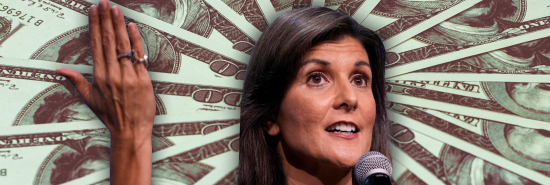
Nikki Haley bets 2024 GOP voters want to hear the hard truths about the economy
Tiana Lowe Doescher
Video Embed
If there’s anybody who can plausibly claim to be a main challenger to former President Donald Trump in the 2024 Republican primary fight, it’s Nikki Haley. And she’s doing it by treating voters as grownups in dealing with the economy.
The former South Carolina governor, who served as U.S. ambassador to the United Nations for nearly two years in the Trump administration, drew plaudits and praise for her performance at the second GOP debate on Sept. 27 at the Ronald Reagan Presidential Library in Southern California. Haley also drew political blood with cutting attacks on rivals like businessman Vivek Ramaswamy and home state Sen. Tim Scott (R-SC).
DEMOCRACY DERBY: HOW MCCONNELL’S HEALTH RAISES STAKES OF KENTUCKY GOVERNOR’S RACE
After months of Haley traipsing around Iowa and New Hampshire, voters are noticing. Haley’s meticulously built ground game in early primary and caucus states is starting to pay political dividends. Haley has climbed to a roughly third-place tie with Ramaswamy nationally, polls show, at around 7% support.
With 9% support in Iowa ahead of its Jan. 15 caucuses, Haley is third behind Trump and a crumbling Gov. Ron DeSantis (R-FL). At 13% support in New Hampshire and 15% support in her home state of South Carolina, Haley has usurped second place from the flailing Florida governor.

Haley has earned a second look from voters specifically by telling them the hard fiscal truths about social program spending driving our explosive national debt. It’s a topic most of the party, Trump included, has shied away from.
By every common definition of the term, Haley has run the most fiscally conservative campaign of the 2024 GOP primary. And she has done so while directly targeting the Republicans responsible for the current state of the economy.
Take Haley’s opening lament of the first debate, invoking President Joe Biden.
“The truth is that Biden didn’t do this to us. Our Republicans did this to us too,” Haley said. She then targeted, by name, GOP rivals DeSantis, Scott, and former Vice President Mike Pence. “They all voted to raise the debt. Donald Trump added $8 trillion to our debt, and our kids are never going to forgive us for that.”
The differences between Haley and Trump run deeper than the former president’s shameless spending spree. Whereas Trump differentiated himself from his 2016 competitors specifically by his utter lack of interest in budget cuts and declining to touch entitlement spending, Haley has proudly promised to raise the Social Security retirement age for younger generations, peg cost-of-living adjustments for Social Security to a lower inflation measure, and limit entitlement benefits for higher-income retirees. And it’s not just on the debate stage that Haley debuted her penchant for professing hard truths.
“We are $31 trillion in debt, almost $32 trillion, and China owns 12% of our national debt. We are having to borrow money just to make our interest payments,” Haley said when I watched her speak to a packed barn in Rye, New Hampshire, back in May. “Now, it would be easy for me to just beat up on Biden for that. But I have always spoken hard truths. And I’m gonna do that with you today.”
Haley added, “All Republicans did that to us, to you. Go and look at that $2.2 trillion COVID stimulus bill that they passed with no accountability whatsoever. They expanded welfare, which now leaves us with 90 million Americans on Medicaid and 42 million Americans on food stamps. Did the Republicans try and fix it? No, they doubled down and opened up earmarks for the first time in 10 years.”
While slashing spending has not been historically popular, the worst inflation crisis in 40 years and the Federal Reserve’s painful but necessary response, culminating in mortgage rates reaching 8%, may have changed the public attitude.
For starters, this election is broadly much more about the economy than any other in recent memory, and unlike the 2008 financial crisis, which was plagued by too few job openings and too little economic activity, the 2023 economy is far too hot with too few workers. That has created a revenue shortfall in the public sector and a supply shortage in the private sector. While entitlement benefits for current retirees may remain the “third rail” of politics, an exploding debt-to-gross domestic product ratio with plenty of new debt maturing into the highest interest rates in 20 years demands an actual solution.
CLICK HERE TO READ MORE FROM THE WASHINGTON EXAMINER
So what is Haley’s? She has teased outright eliminating the regressive state-and-local tax deduction, which Trump’s Tax Cuts and Jobs Act capped at $10,000 in 2017. This would provide an extra $25 billion in revenue to the federal government to fund further tax cuts for the middle class and the federal gas and diesel tax. On top of entitlement reform, Haley would also demand pre-COVID-19 spending levels. Haley would also obviously ban earmarks and reverse Biden-era green energy subsidies.
Conventional conservative economics failed against former President Barack Obama and then Trump when inflation and interest rates remained low, rendering the cost of government borrowing near zero, or so they told us. Haley is betting that the crisis is catastrophic enough that voters don’t want hope or change or a return to the past but rather an accountant in the Oval Office.
